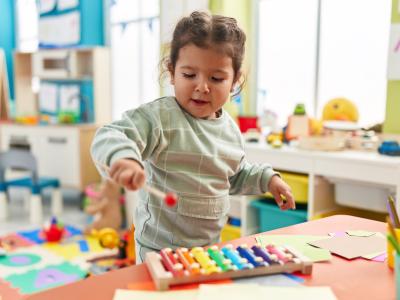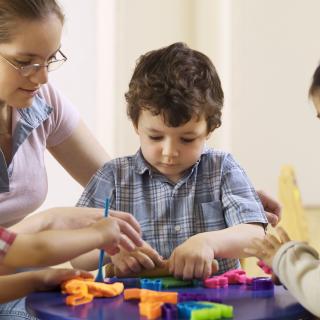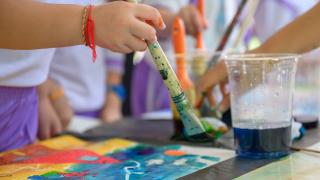
Dual Language Learners
Pioneering research to support Dual Language Learners, teachers, and families. Our work creates tools promoting linguistic & cultural diversity in education.
Research about best practices for Dual Language Learners not only benefits DLLs directly but also enriches the overall early education landscape by promoting culturally responsive and equitable educational approaches. We can develop more effective and inclusive educational practices that celebrate linguistic and cultural diversity while supporting the academic and holistic development of these children. We know educators need specialized training to effectively support DLLs in the classroom and that data that informs whether these practices are in place are essential for creating effective policy. Our research and tools can guide the development of teacher preparation programs, ongoing professional development, and policies needed to create systems that best support DLLs in classroom spaces.
Building Early Learning Latiné Educators (BELLE)
The Building Early Learning Latiné Educators (BELLE) program is a leadership academy with a primary objective of enhancing the presence of Latiné leaders in influential roles. Key goals of BELLE encompass:
Cultivating a Latiné ECE leadership pipeline using a culturally and linguistically affirming professional development approach, thereby amplifying Latiné representation in decision-making capacities.
Bolstering the recruitment and retention of Latiné educators in the field of early childhood education.
Elevating the quality of support for bilingual acquisition within early childhood education settings, particularly for emergent bilinguals.

Featured Research
Developing a Pipeline of Latine Early Childhood Leaders in New Jersey, A Unique New Model
Currently, 94% percent of the workforce are women and about 24% are Latine though as you climb the elementary school ladder, there is less and less Latine representation, with only about 13% of K-12 teachers and 8% of K-12 administrators identifying as Latine. This is problematic for several reasons. First, it does not reflect the population of Spanish speaking dual language learners (DLLs), who account for about 32% of children under age five. Second, there are advantages to linguistic and cultural matches in the classroom including supporting bilingual acquisition that simply cannot occur without Latine educators in these spaces. Representation matters on its own, so does the training and knowledge that these educators possess which can make them stronger advocates for policies and practices that benefit Spanish-speaking DLLs. Third, absence from leadership has long-term earning implications for Latines in the system.

Access Our Research Library
The National Institute for Early Education Research's comprehensive research library serves as a valuable resource for educators, policymakers, researchers, and anyone interested in the field of early childhood education. The library is a repository of research reports, policy briefs, academic papers, and other publications related to early childhood education. Many of the resources in the NIEER Research Library are made available for free as downloadable PDFs or accessible through links.





